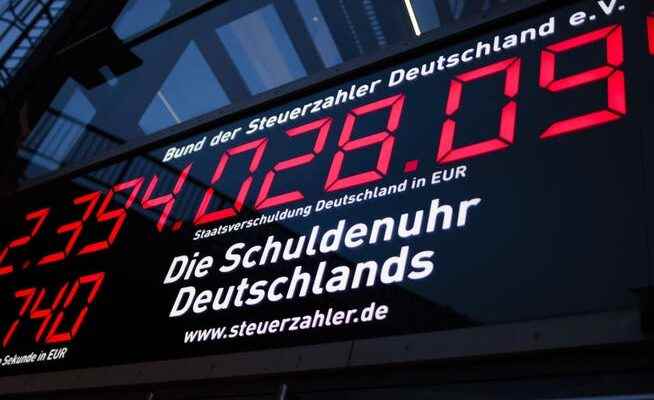Once a year, the Association of Taxpayers Germany uses concrete examples to show how it sees taxpayers’ money being wasted. His latest black book is an anniversary edition.
A “debt clock” at the headquarters of the Taxpayers’ Association in Berlin’s government district shows the current status of German national debt (pictured: status as of January 5, 2022).
From traffic circles that are too narrow to questionable procurement methods for protective masks in the Corona crisis: Also in this year’s edition of his published on Wednesday Black book «The public waste 2022/23» the German Association of Taxpayers denounces 100 cases in which it believes taxpayers’ money has been wasted at federal, state and local level. To a certain extent it is an anniversary edition, as the association has been publishing the black book for 50 years now.
The mask debacle
Several examples listed in the black book have to do with the corona pandemic. The taxpayers’ association criticizes a federal procurement procedure for protective masks. The Federal Ministry of Health used the relatively rarely used so-called open house procedure. In doing so, the client offers the procurement of a specific contractual item at fixed conditions and prices. Every supplier who is able and willing to deliver is invited to make the goods available under these conditions; in return, he is guaranteed to receive a contract.
According to the assessment of the taxpayers’ association, this “exotic procedure” is poorly suited for mass-produced goods such as protective masks, especially if the requirements are only lax and everything is to be processed properly under great time pressure. The result was a “mask delivery avalanche”: 738 contracts were awarded to 535 contractual partners and 276 million FFP2 or KN95 masks and 78 million surgical masks were delivered.
The ministry was overwhelmed and hastily hired a management consultancy: it called on an average of 65 experts for “support services” and spent almost 37 million euros over the entire term. To date, the list of problems, including disputes about delivery times, the quality of the masks and the faltering payment of the suppliers, has not been fully worked out. By early 2022, around 30 settlements had been reached with frustrated traders, and dozens of lawsuits were still pending in court. So far, the federal government has had to pay more than 13 million euros for damages and legal costs alone. An end to the expensive consequences of the open house procedure is not yet foreseeable.
When the roundabout is too narrow
The Black Book is not a systematic analysis of the extent of the problem or changes from the previous year. Rather, the association, which sees itself as the “financial conscience of the Federal Republic”, wants to shake things up and give impetus to the public debate about the economical and economical use of tax money. This is all the more important as the current crises have led to an unprecedented expansion in public spending, he noted. “Instead, hundreds of billions of euros in new debts are taken on in secondary budgets and the budget is not scoured for savings potential,” criticized the association’s president, Rainer Holznagel, when the black book was presented.
Some of the examples given are bizarre, others are overblown prestige projects, others again bear witness to drastic cost overruns on ongoing projects. A case from the Hessian municipality of Egelsbach almost falls into the category of pranksters: As part of the construction of a cycle expressway between Darmstadt and Frankfurt, a roundabout was built there that regular buses were to use as a turning point. The new construction of the roundabout cost 125,000 euros, of which 80 percent was borne by the state of Hesse and 20 percent by the municipality of Egelsbach.
The building was just way too small. Instead of the diameter of 22 meters calculated by the community, it only had a diameter of 17 meters. Only after completion did it become apparent that the roundabout was difficult for buses to drive on. When the bus operator was finally involved, it also turned out that a diameter of 24 meters would even be necessary for large buses. The reasons for the bad planning are said to have been communication problems between the departments involved and staff changes and thus a temporary lack of staff.
To remedy the situation, the roundabout is not to be enlarged, but a bypass is to be built and the road space on the other side of the roundabout is to be enlarged and sidewalks are to be laid. The conversion costs are estimated at 75,000 euros. The taxpayers’ association quotes the municipality as saying that the conversion only costs 7,000 euros more than if this solution had already been taken into account in the original planning. The planning office commissioned at the beginning wants to take on this additional sum.
Play of light on the Spree
With planned net costs of around 1.2 million euros, a political video and light show in front of the Bundestag in Berlin was significantly more expensive, which the association considers to be doubly wasteful: financially and energetically. While the Federal Ministry of Economics is calling on citizens to take shorter showers and cook with the lid on the pot, part of Berlin’s government district has been transformed into a cinema every evening, he writes.
From July 3rd to October 3rd, the facade of the Marie-Elisabeth-Lüders-Haus, a Bundestag building directly on the Spree, was used for a light and sound projection on the history of German parliamentarism, with two half-hour screenings per Day. The taxpayer lobby concedes that politics and democracy do not come for free and that parliamentary democracy has to be promoted again and again. In view of the federal government’s record debt and energy-saving appeals to the citizens, such a film and light show at the expense of taxpayers seems “out of date”.
You can contact the Berlin business correspondent René Höltschi Twitter follow.
